Rebuild: empowering people to live free from exploitation
Rebuild East Midlands provides long term person-centred support to survivors of modern day slavery and exploitation in Derbyshire.
Rebuild East Midlands provides long term person-centred support to survivors of modern day slavery and exploitation in Derbyshire.
Charity location
Focus
Grant size
Rebuild exists to ensure that anybody who is recovering from exploitation or modern slavery has access to support and doesn’t have to recover alone. We offer long term support, which looks different for each person, and includes one-to-one casework, practical support, advocacy support around immigration, help accessing benefits and housing etc. And in all of this, we provide emotional support which is absolutely key due to the trauma that most of the people we work with have experienced.
Long term support continues to be one of the biggest gaps in services for survivors of modern slavery and exploitation. People go through the government process, the National Referral Mechanism, but when they exit that, they have to apply for benefits, set up bank accounts, and find accommodation – and they’re on their own. Most people don’t have any ID because that's been removed from them by traffickers. So even getting an ID to open a bank account to then apply for benefits can become a real struggle. People are left with no support, and there’s a high risk of destitution and homelessness, and being re-exploited.
We work with a small number of people so that we can provide support for as long as they need. We’re driven by what each individual wants and their unique needs. Ultimately, we want to ensure that when people exit our support, they're just like anybody else in the community. They’re connected with universal services and they can live independently without special support from us. It’s about genuine long lasting change. Some of the people we’ve supported wouldn't leave the house or talk to anyone when we first met them, but now they are in employment or going to university; we’ve seen people get married and start a family, which is wonderful to see. We want people to be able to fully move on with their lives.
Recovery is not a linear upwards trajectory. After people have left our service, we check in with them after about six months to see if they’re still in stable accommodation and in some form of employment or education, because these things reduce the risk of re-exploitation. It's really about having somebody else in it with you. Often people are so isolated and they don’t have anyone around them that they feel they can trust, but they know they can talk things over with us.
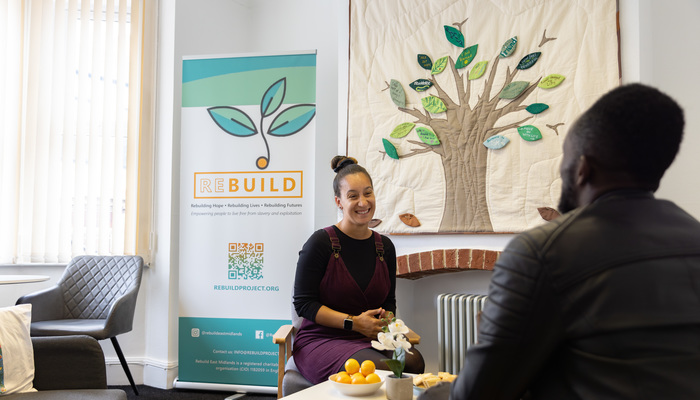
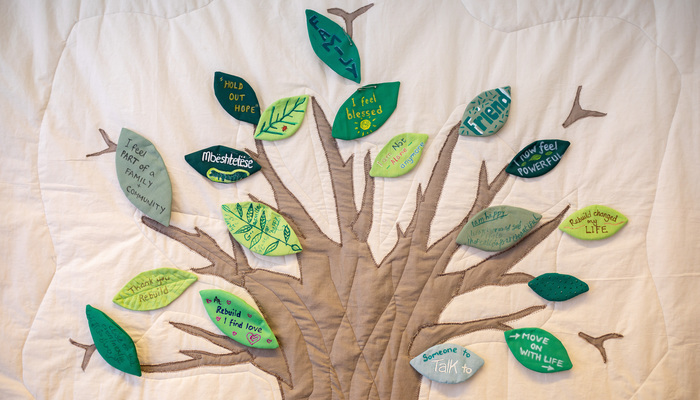
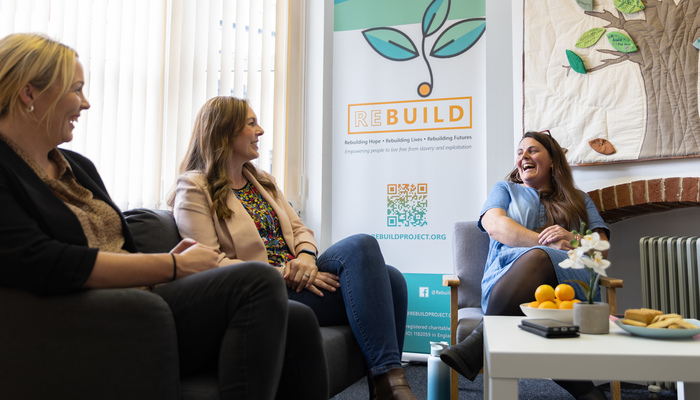
Trauma impacts all aspects of a person’s life and that informs how we approach everything. For example, a survivor may speak little to no English but, because trauma affects your ability to learn a new language, they can’t make much progress in developing their English skills. Things that seem relatively simple, like writing a CV, can be extremely challenging, because employers want to know why there are gaps in employment and people don’t want to talk about what’s happened to them. So, even practical support like CV-writing needs to be delivered in a trauma-informed way, and we make sure that people are getting the support they need to process what’s happened to them.
A lot of systems in the UK can be complex and compliance-based, which makes it difficult for people who have experienced exploitation. After people come out of exploitation, they are trying to navigate complex systems, like housing and benefits, where if they don’t do things correctly they can get sanctioned. Even just navigating those systems can be really retraumatizing, as it mirrors the compliance that might have existed in their exploitation.
Accessing stable accommodation is often a pivotal point for people – when they get the keys to their own place, they are finally able to feel a sense of physical and emotional safety. Until people get to that point, the uncertainty is a massive challenge. In addition to that, some of the people we work with are asylum seekers and they’ve been waiting for years for a decision. While they’re in that limbo, they can’t move on or recover – especially if they may be returned to a country where they were being exploited.
Despite all these challenges and barriers, we work with some of the most resilient, amazing people on the planet because they have survived so many things. They are getting on with life under enormous stress and they’re doing everything they can to move forward with their lives.
Anytime I'm in trouble, anytime something is too much and I’m in tears, I know I can go to Rebuild for help which is very good. I just knock on the door and they open it, they're always checking in on me and it’s lovely. If I didn’t have their support, that would be really, really hard, and having to go through the mental pain on my own as well.
Sometimes I feel like I don't want to go home, I want to stay here! Anybody that opens the door, the welcome that they give you will be the best thing you will receive that day. I want to say thank you to all the team for their support. I am so grateful for all of them, they are lovely.
- Elise
Since I’ve been supported by Rebuild, I believe I became more tough. I’ve built my confidence by knowing where places are, what I need to do next. I’ve been maturing and becoming more tough and that's thanks to their help. On my own, I wouldn’t know where to go or what to do next. They helped me to find the doors I need to knock on – for housing, college, work, everything.
I feel stronger now and more adapted to this country as a new person. I am becoming more connected to this city and these people. You can really feel that genuine welcome from all the staff at Rebuild. And I am thankful for each one of them.
- Dina
We’ve been connected with Lloyds Bank Foundation since our early days. Rebuild started as a pilot project with the local authority and when that came to an end, we started looking at applying for funding. Gary Beharrell, who is now our Regional Manager from the Foundation, came out to meet us for an informal chat, which was brilliant because he gave us a lot of guidance and talked us through how to apply for the funding.
We've now had four years of funding from the Foundation and it has genuinely been the gift that has kept on giving. When you're a small and young organisation, everybody wants to fund projects. And that's great, but that’s funding the top of the table and not the legs. I think the Foundation’s approach to supporting small charities is genuinely brilliant because the unrestricted funding has allowed us to grow sustainably by strengthening our core. It’s allowed me to move more into the CEO position, and it’s allowed us to have a bit of flexibility so that we could apply for other funding and start to look at growth. The multiple year funding that the Foundation offers makes such a difference because we are able to plan and grow because we've got sustainable funding.
The development support that the Foundation offer alongside the grant has been absolutely phenomenal. We’ve had support with so many things, including our fundraising strategy, and setting up our accounting and case management systems. These are some really key things for a small organisation and it would have been so hard for us to do without the development support.
We’ve also been able to offer our staff one to one coaching and wellbeing workshops. We want to invest in our team, but we wouldn’t have been able to afford these things on our own. But the Foundation’s approach of seeing the bigger picture and supporting the whole organization rather than one-off projects has genuinely been so beneficial to us.
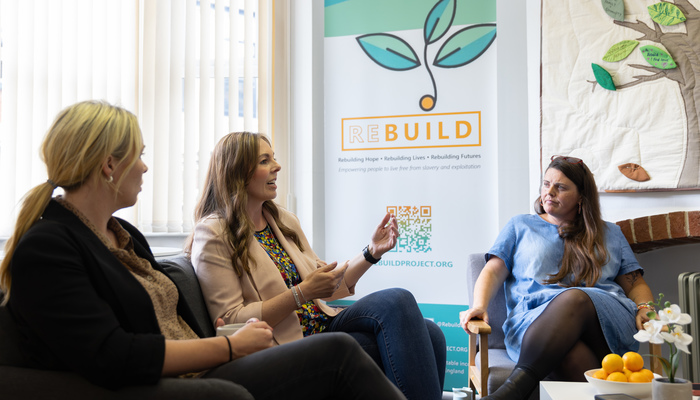
Left to right: Lisa Marriott, Chair of Trustees; Diane Rogers, Support Delivery Manager; Lesley Gladwell, CEO, at Rebuild East Midlands
When you look at the sector as a whole and staff retention, the burnout rate is astronomical. But we're here, six years in, and we've retained majority of our staff team. That’s really unusual, and that’s in part due to the development support from the Foundation which has enabled us to access support and coaching which has been so empowering to our team. Personally, I’ve found the coaching life changing and a lot of the team would say the same.
– Diane Rogers, Support Delivery Manager, Rebuild East Midlands
I think the Foundation’s approach to supporting small charities is genuinely brilliant because the unrestricted funding has allowed us to grow sustainably by strengthening our core. The multiple year funding that the Foundation offers makes such a difference because we are able to plan and grow because we've got sustainable funding.
- Lesley Gladwell, Founder and CEO, Rebuild East Midlands
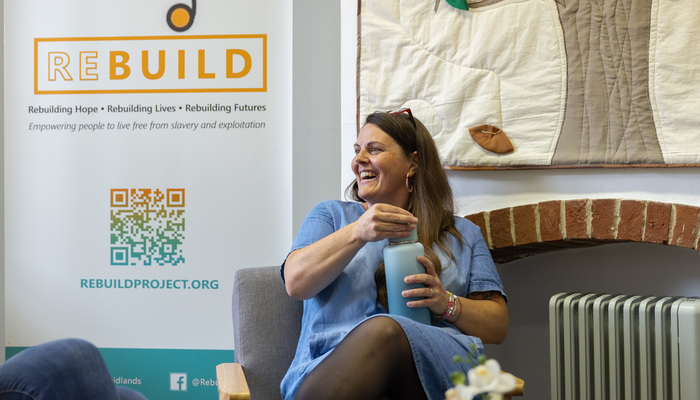
Lesley Gladwell, CEO, Rebuild East Midlands
One of the things I've already always really appreciated about the Foundation’s development consultants is their willingness to teach us skills, because when they’ve gone, we have to do some of those things ourselves. For example, one consultant helped us write our first stage of a funding application and helped me write the funding plan, which ultimately led to us getting a large grant. But then, more importantly, he sat with me for a couple days and talked me through how to do it all which equipped me to take that forward. But there’s also a nice balance of the consultants being able to take some work completely off our hands, and do things for us that we won’t necessarily have to do again that would have taken us months to get done on our own.
When we first started out, we could have gone so wrong with so many different things without the guidance we’ve had from the Foundation. Just being able to talk things through with Gary was really helpful for us as a young organisation, because he talked through the different consultants and opportunities and helped us find the best fit.
We’ve just been approved for another three years of funding from the Foundation and we are in a position now where we can recruit new staff and grow our team, so we feel really grateful. But we are definitely feeling the stretch on universal services at the moment. We have referrals coming in that should be getting picked up by adult social care, but they’re coming straight to us. The charity sector has always been propping things up, but it feels much more intense right now and it's incredibly difficult to manage the complexity of needs that people have. The challenge is that so many more people need help, and we can't always meet that, and statutory services don't have capacity either. We always want to support people where we can, but then taking on too much affects the wellbeing of our team, so it’s a constant balancing act.
Over the past year, we have navigated so many changes in the statutory guidance for working with victims of modern slavery, which has significantly changed how we work with people and what is available for them. National support has been much harder to access, and this creates more uncertainty about what services might be available in the future. We have just had to focus on being clear about what we do and how we fit into the support landscape and keeping the people we support at the centre of what we do.
As we look ahead to the future, there are some exciting developments and opportunities. We have been running an initial response project with the local authority, where we provide short term support to individuals who have just been found in exploitation across Derbyshire. We help meet the immediate needs – finding accommodation, food, clothes – and support people while they decide what they want to do next. Sometimes, that may turn into long term support with us, but usually people need to move out of the area because they've been exploited locally.
When we started Rebuild six years ago, the local authority asked us to consider running that response project, but at the time we really wanted to focus on the long term support. But since we’ve been able to expand our team, we felt we were in a position to take that project on. We delivered it for a year, and then we offered to develop the service into something much more comprehensive and we’re just about to launch that. This will enable us to proactively go out into the community and raise awareness of modern slavery and exploitation, because we know they are more victims in the community. And we know there are certain communities where victims are more hidden. We’re developing a package of support that could potentially be replicated in other locations, so that’s really exciting.
We're also starting to see an increase in referrals of UK nationals. We’ve always known that potentially there have been UK nationals who might want access to support, but the challenge was in reaching those people, so the fact that some of the referrals are coming in is exciting. Ultimately, we want to be available for anybody who is in Derbyshire who has experienced exploitation. So, the more people are aware that we exist, the more we can reach those people and offer our support.
Ayo's Story
Rebuild came into my life during a very difficult time, and they were helping me with whatever I needed. I’m from a different background, different society, different culture, everything is different. But when people are there for you to support you, it’s a massive thing.
I'm an asylum seeker and the first time I did my interview, I got a negative response. I was so down because I wasn't expecting it. And I was feeling so lonely. But the staff at Rebuild stepped up for me. They were messaging me, checking on me, asking me how I am feeling. I felt that someone is there for me and I'm not alone. That was absolutely amazing. They provided a psychologist to talk to me about my situation, and I'm so grateful for that.
Rebuild have helped me in so many ways and played such a big part in my life. I have people I can talk to and get advice about my life and my future which is so good for me. They helped me to get a place at the local college, which I was buzzing about because I want to become a teacher. And they even created a football tournament for us – that was a dream for me because I absolutely love football!
I don’t have my asylum status yet but Rebuild have been helping me and they’re in contact with my solicitors. Before, if I wanted to go outside I was worried about what might happen. But the staff at Rebuild helped me to feel free, they are always supporting me and telling me that if I need anything or have a problem, I can call them. So now I can walk around without fear.
If I get my asylum status, I will have to have a party at Rebuild! Because they have helped me so much. But whatever happens, I feel that I will be OK because I have their support. I'm so grateful to have met such great people like them. They make me a better man. I was down and they lifted me up. They gave me my smile back!
Find out more about Rebuild East Midlands by visiting their website: www.rebuildproject.org